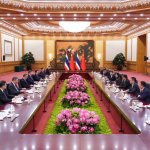
Recently, a 16-year-old male teenager was accused of committing lèse majesté. The teenager was summoned by the Yannawa Police Station in Bangkok after the administrator of a popular Facebook page had filed a complaint with police against him. The case is a landmark one for Thailand, as the teen could be the youngest ever person to be charged under Section 112 of Thailand’s Criminal Code.
If found guilty, he could face as many as 15 years in prison.
The charges come shortly after Thai authorities have charged at least 23 individuals with defaming the monarchy, including high-profile protest leaders calling for monarchical reform, including Parit “Penguin” Chiwarak, Arnon Nampa, Panusaya Sithijirawattanakul, and Jatupat “Pai” Boonpattararaksa.
The lèse majesté charges came after Thai Prime Minister Prayut Chan-o-cha said that the government would accelerate the use of more draconian measures against pro-democracy activists who are demanding fundamental structural changes, including Prayut’s removal and a number of reforms to the monarchy.

Pravit Rojanaphruk of Khaosod English, posted on Facebook that the teenager was “likely the youngest-ever” to be charged with Article 112, however he is not the first youth to be hauled before the military-backed government and accused of a serious crime. In 2017, a 14-year-old boy was detained by the Thai military in connection with three other young people, for allegedly setting fire to a portrait of the late King Bhumibol Adulyadej. Abhisit Chailee was held by authorities in military detention at the 11th Army Circle Camp in Bangkok and was denied access to a judge or access to legal counsel.
The issue concerns matters of international law.
Thailand is a party to the Convention on the Rights of the Child (CRC), an international treaty that legally defines childhood as lasting until age 18 and states under Article 37—regardless of the circumstances—that the arrest, detention or imprisonment of a minor child should be a measure of last resort. While states sometimes raise objections to international standards set by the CRC, particularly in cases where a minor child has been involved in acts of terrorism or engaged in activities with extremist groups that have been deemed threats to “national security”, lèse majesté charges in both cases clearly neither rise to that level or produce moral dilemmas that test established norms of international law.
However, Thailand wrongly considers lèse majesté a threat to its national security. The CRC, for good reasons does not allow wide limitations to its provisions, and regardless of the crime they are accused of, children—even those that are accused of terrorism-related crimes. Children, until the age of 18 should be treated in line with international juvenile justice standards, and use alternative forms of rehabilitation rather than incarceration with adults.
It’s not just young children that are being dragged by Thai authorities before the courts on charges of lèse majesté. Older persons have been victims as well. Case in point, Sulak Sivaraksa, then 85-years old and charged after he questioned the historical account of a 16th-century battle between King Naresuan and the Burmese Crown Prince Mingyi Swa. The Buddhist spiritual leader, author, scholar and social critic has been accused several times of the same offense. While the last charge was so egregiously laughable that the decision to charge him was postponed, it demonstrated the willingness of the regime to use any means at its disposal to silence or intimidate its critics, regardless of their age.
Back in 2017, the United Nations Special Rapporteur on Freedom of Expression, David Kaye, called on the regime to refrain from using lèse majesté as a political tool to stifle or silence political speech. Kaye noted that forms of political expression that are considered to be insulting to a public figure, even a monarch, is insufficient to justify Thailand’s severe restrictions or penalties. His comments came after Jatupat was awaiting trial for a previous lèse majesté charge and was the first charged after King Maha Vajiralongkorn took the throne.
Since the 2014 coup d’etat, the UN Human Rights Committee has remained concerned about the sharp increase in the number of people detained and prosecuted for lèse majesté, as well as Thailand’s extreme sentencing practices, which resulted in lengthy periods of imprisonment for some convicted. Thailand, via the United Nations Office of the High Commissioner for Human Rights (OHCHR) needs a reminder once again that arbitrary detention and arrest of citizens is out of conformity with international human rights law, particularly Article 19 of the International Covenant on Civil and Political Rights.
Thailand’s recent charges of lèse-majesté have exceeded absurdity. The resurrection of lèse-majesté as a political tool for repression, harassment and to secure the silence of regime critics is beyond justification and beyond reason. Thailand’s military-backed government is now retreading on slippery ground, which could have terrifying implications for minor children and young people exercising their human rights to free expression.






